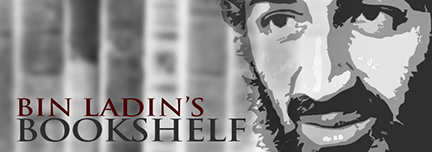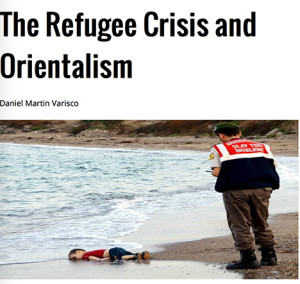Category Archives: Terrorism Issue
Why it (Still) Makes Little Sense to Call ISIS Islamic

A member of ISIS poses in a fighter jet similar to those used in the Prophet’s time.
By Haroon Moghul, Religion Dispatches, August 24, 2015
Last week, The New York Times’ Rukmini Callimachi published “A Theology of Rape,†a report as important as it is horrifying. Unfortunately, like several recent exposés on the Islamic State in Iraq and Syria (ISIS), including Graeme Wood’s website-busting What ISIS Really Wants, Callimachi’s reporting is unusually receptive to the movement’s claims. Namely, that plausible Islamic arguments can be made for slavery, rape, and other crimes.
In support of his own argument that ISIS isn’t just “Islamic,†but “very Islamic,†Wood cited Princeton academic Bernard Haykel who insists that anyone who denies ISIS’ Islamic authenticity is being disingenuous (who says this is never elaborated on). Wood then proceeded to analyze ISIS’ “Islamicity†based almost entirely on Haykel, several fringe Muslim scholars, ISIS sympathizers, and no mainstream voices.
This is a problem. Journalist Murtaza Hussain explains that, “We invariably view conflicts involving Muslim groups as being driven primarily by atavistic religious beliefs.†Which is why, he adds, we jump to “texts and ideology to explain contemporary events. We don’t do this with the recent Israeli war on Gaza, even though that conflict also contains clear religious connotations and justifications.â€
Only weeks ago Jewish radicals lit a house on fire and burned a Palestinian child to death. Last year another Palestinian child was burned alive. Yet I don’t recall articles in the Times, the Atlantic or any other popular media assessing the act’s conformity with Judaism, or arguing that “price tag†attacks are not just “Jewish,†but “very Jewish.†There are, in fact, radical Jewish sects who preach indiscriminate violence citing G-d and the Torah, but these claims are not entertained as serious.
“ISIS,†laments Hussain, “has been granted full civilizational power to speak for and represent Islam.â€
For the rest of this article, click here.
Tunisia after the terror attacks

by Rachid Ghannouchi © Qantara.de 2015
Translated from the German by Nina Coon
A battle for freedom and dignity
In the wake of the attacks on Sousse and the Bardo Museum, Tunisia has to stand up to those who oppose the nation’s democratic development. The best way to counter the feelings that draw young people to extremism, writes Rachid Ghannouchi, chairman of the Ennahda Party, is to ensure participation, fair economic growth, and security without restricting the country’s hard-won freedoms
On 4 July, the United States celebrated the attainment of freedom and independence as it does every year. In Tunisia, 4 July also marked a turning point on the path to freedom and democracy – but not in the positive sense. On this day, Tunisian President Beji Caid Essebsi felt compelled, in response to the growing threat of terrorism, to declare a national state of emergency and curtail important personal freedoms.
The latest attack in Sousse has again made it clear just how stony Tunisia’s path to a secure democracy remains. After all, the bloodiest terrorist attack in the history of our nation seeks to destroy what we have built up in the few years since Ben Ali was ousted, namely an open society with a pluralist governmental system and a democratic constitution enshrining fundamental rights and freedoms.
Battle for the young generation
We were all horrified by the gruesome images of tourists murdered on the beach. But those images have also galvanised Tunisian citizens and their political representatives in their opposition to those who oppose our path to democracy. This battle is a battle for freedom and dignity, but first and foremost, it is a battle for the next generation, for the young people in Tunisia, but also in Libya, Syria and the entire Arab world. Continue reading Tunisia after the terror attacks
Voltaire on Tolerance

The author of Candide knew that this was not the best of all possible worlds. But Voltaire has sound advice about the importance of tolerance, written over two and half centuries ago…
It does not require great art, or magnificently trained eloquence, to prove that Christians should tolerate each other. I, however, am going further: I say that we should regard all men as our brothers. What? The Turk my brother? The Chinaman my brother? The Jew? The Siam? Yes, without doubt; are we not all children of the same father and creatures of the same God?
But these people despise us; they treat us as idolaters! Very well! I will tell them that they are grievously wrong. It seems to me that I would at least astonish the proud, dogmatic Islam imam or Buddhist priest, if I spoke to them as follows:
“This little globe, which is but a point, rolls through space, as do many other globes; we are lost in the immensity of the universe. Man, only five feet high, is assuredly only a small thing in creation. One of these imperceptible beings says to another one of his neighbors, in Arabia or South Africa: ‘Listen to me, because God of all these worlds has enlightened me: there are nine hundred million little ants like us on the earth, but my ant-hole is the only one dear to God; all the other are cast off by Him for eternity; mine alone will be happy, and all the others will be eternally damned.”
Looking Away from “Bombs Away”
Bin Laden’s Bookshelf

In case you were wondering what kinds of books Bin Laden was reading, at least in his Pakistan compound before his demise, the U.S. Government has provided a list. This is at http://www.dni.gov/index.php/resources/bin-laden-bookshelf?start=3 Some 75 of over 400 items listed were publicly available U.S. Government reports; it seem he could have written a thesis in International Relations while in hiding. It is an odd collection, from current political accounts to the bizarre. I am sure that finding Bloodlines of the Illuminati by Fritz Springmeier will spring several new conspiracy theories. I just wonder how far Bin Laden read into a book of 624 pages…
Commentary Hell

We moderns devour news as if it were a staple food. Gone are the days when one sat down for coffee in the morning with a daily newspaper. There are still newspapers of every flavor, but news is now the product of digital media. And the news cycle grows shorter all the time. During the American Civil War it might take weeks for reports of battles to be reported in the papers. The telegraph and telephone made the news flow a bit faster, but until digital formats news was always at least a day old, if not more. Now many events are instantaneous. Mobile videos of police brutality go viral in minutes. And the sheer number of news and social media sites could easily fill up surfing all 24 hours of the day.
In the old days newspapers were selective in publishing letters to the editor. Really nasty retorts and profanity rarely made it into print. But most sites today leave space for comments from anyone. The results are pathetic. Rational discussion of issues raised is almost non-existent. Curses and lunatic projections are common. I was reading an Al Jazeera article entitled “How is ISIL expanding?†Al Jazeera disclaims all liability for anything posted as comments and well they should.
Below are some of the comments posted (apart from the spam that have nothing to do with the article). The mentality of some of the individuals matches their inability to write in English. Prejudice über alles in cyberspace:
Start cooking the popcorn as sunni and Shia showdown  looms on the horizon. ……All muslime countries  need to be destabilised and turned  into flea infested wastelands. CIA, MOSSAD  and RAW collaboration achieving excellent results. Continue reading Commentary Hell


